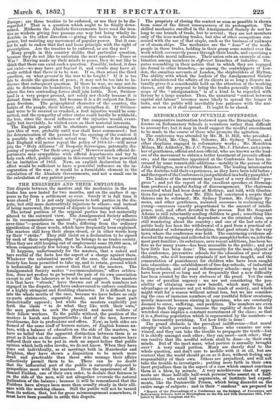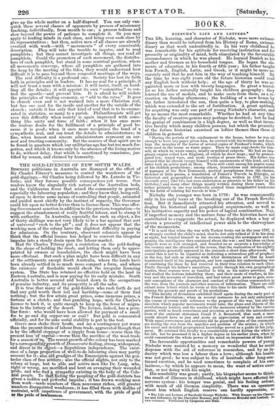REFORMATION OF J U V LNILE OFFENDERS.
THE comparative inattention bestowed upon the Birmingham Con- ference on Reformatory Schools is vexatious rather than difficult to account for; but it may in itself suggest the needful amendment to be made in the course of those who promote the agitation. The conference was attended by Mr. M. D. Hill, who presided ; by Mr. Field, Mr. Clay, Mr. Osborne, Mr. Sydney- Turner, and other chaplains engaged in reformatory works ; Mr. Monokton. Milnes, Mr. .A.dderley, Mr. I. C. Symons Mr. J. Fletcher, and a num- ber of gentlemen, official and non-official, who are known as the lead- ers of the movement to obtain a better treatment of juvenile offend- ers; and the committee appointed at the Conference has been in- creased by some remarkable additions—notably in the person of Sir John Pakington, now a Cabinet Minister. The leading missionaries of the doctrine told their experiences as they have been told before ; and the report of the Conference is jus4ublished in abulky pamphlet.* The leaders of the movement may boast of a very decided " pro- gress " ; and yet the report of the excellent speeches at Birming- ham produces a painful feeling of discouragement. The chairman recounted what had been done at Mettray, and told, with illustra- tions for general use, how Mr. Ellis had convinced a sceptic that thieves can be reformed ; Mr. Sydney Turner, Mr. Jellinger Sy- mons, and other gentlemen, narrated successes in reclaiming the young—successes exactly proportioned to the amount of intelli- gence, zeal, and effort devoted to the process. But Mr. Sergeant Adams is still reluctantly sending children to gaol; something like 130,000 children, vagabond dependents on the criminal class, are still wandering about the country ; and one of the last sots of a public body has been the withdrawal of a gaol from a practical ad- ministrator of reformatory discipline, that gaol situate in the very town where the conference was held. The convincing evidence ad- duced at the meeting and collected in this pamphlet before us,is for the most part familiar; its substance, save recent additions, has been be- fore us for many years—has been accessible to the public ; and yet how little has been done ! The necessity for the main objects of the conference, preventive schools for the education of poor stray children, who will become criminals if not better taught, and the commutation of punishment for children who have been caught into education—the establishment of free day-schools, of industrial feeding-schools, and of penal reformatory schools—may be said to have been proved so long and so frequently that a new difficulty has been created by the very staleness of the proof. Yet the case is one of peculiar urgency : we are not considering the pos- sibility of attaining some new benefit, which may bring ad- advantages or pleasure not yet within reach of society, and which might wait for a season without actual loss, but we are consider- ing the case of immense numbers of our youthful fellow creatures, mostly innocent because sinning in ignorance, who are constantly doomed to error, suffering, and perdition. The numbers are even greater than they appear, because the rapidity of deaths in that wretched class implies a constant recruitment of the class; so that it is Vloating population which is represented by the numbers—a class incessantly perishing. Yet how little is done ! The grand obstacle is the prevalent indifference—that moral atrophy which pervades society. Those who examine are con- vinced, and they can take the trouble to propagate the truth—but it is chiefly amongst each other • they can meet—each other ; they can resolve that the needful reform shall be done—in their own minds. But of the inert mass, what portion is annually brought over ? A very small portion. Many are sheerly deaf to the whole question and don't care to meddle with it at all, but are content that the world should go on as it does, without feeling any responsibility of their own. Others are prejudiced, and will not take the trouble to investigate ; putting more faith in their own inert prejudices than in the aspect of a ease which cannot oonvinoe them at a blow, by miracle. A very mischievous class of oppo- nents are those half-idle half-weak persons who assent on a hoz conviction ; who retail bad arguments, or institute bad experi- ments, like the Pentonville Prison, which bring discredit on the entire range of subjects ; and in their " candour " are prepared to
• Report of the Proceedings of a Conference on the Subject of Preventive and Reformatory Schools, held at Birmingham on the 9th and 10th December 1851. Pub- lished by Messrs. Longman and Co.
give up the whole matter on a half-disproof. You. oan only van- quish these several classes of opponents by process of missionary teaching, individually, from mouth to ear; a process tedious and slow beyond the power of patience to complete it. Or you may apply to leading minds in each class, and bring over eaoh class by its representatives : but then, active men of all classes are already overlaid with work—with " movements " of every conceivable description. They will take the trouble to inquire, and to read pamphlets ; but they cannot investigate all things, nor read all pamphlets. Could the promoters of each movement, the distribu- tors of each pamphlet, but stand in some centrical position, where all movements converge, where all pamphlets are gathered into the heap by the meeting of the tides, they would understand how difficult it is to pass beyond those congested meetings of the ways.
The real difficulty is a profound one. Society has lost its faith both in principles and in leaders. It has no zeal for a principle, it will not trust a man with a mission : it will insist, itself, on hand- ling all the details ; it will appoint its own " committee " to con- trol the apostle—and prevent him. It is afraid he will violate the principles of trading economy, or "add to the rates." It goes to church even and is not warmed into a more Christian zeal, but has one soul for the inside and another for the outside of the church ; outside it has only that kind of soul that is to be enume- rated in statistics, so many to a parish. Philanthropists will get over this difficulty when society is again impressed with some- thing like unity and force of faith ; when it has once more the zealous desire for the fulfilment of a principle of good be- cause it is good ; when it once more recognizes the bond of a sympathetic zeal, and can trust the details to administrators; in fine, when honest and sincere administrators represent an ear- nest and trusting community. But the sources of that spirit are to be found in quarters which our utilitarian age has but too much for- gotten, and which it knows only by the absence of the living motive to do, without delay, that which is sanctioned by conscience, jus- tified by reason, and claimed by humanity.



























 Previous page
Previous page